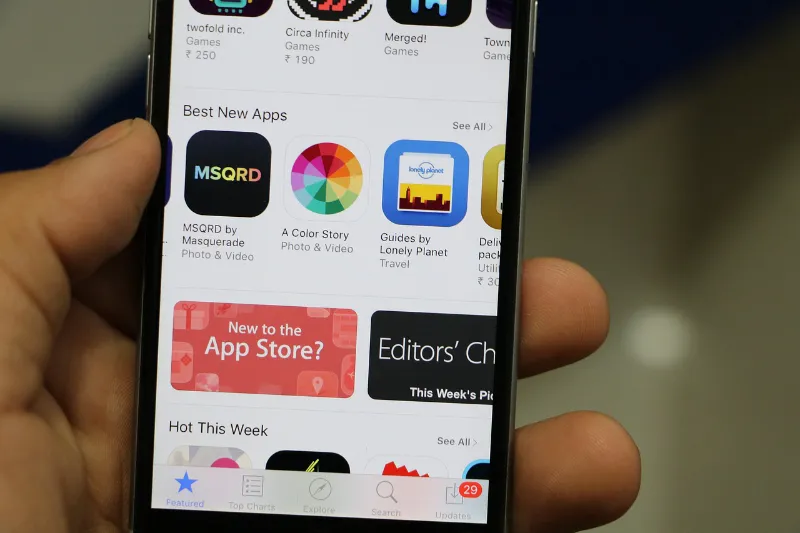If you're developing an app, one of the biggest decisions you'll make is choosing where to publish it: Apple's App Store or Google Play. Each platform has its own strengths, weaknesses, and unique challenges that impact how your app performs, how users discover it, and how much revenue you generate.
For app development companies, understanding these differences is crucial to building successful mobile applications. In this article, we'll break down everything you need to know about market share, development processes, app submission policies, monetization strategies, security, and more to help you make an informed decision.
The Apple App Store and Google Play Store are the two largest platforms for mobile app developers to submit their apps. The App Store vs Google Play comparison reveals key differences in their operating systems, number of apps, and approval processes. While both stores offer millions of apps, the Google Play Store typically has a larger selection compared to Apple. App Store vs Google Play highlights differences in revenue models and store vs Google Play Store policies. Play Store differences for developers include easier submission processes, but potentially lower earnings.
For a marketer, understanding the nuances between Google Play and App Store is crucial for an app's success. When deciding whether to submit your app to the Apple Store or Google Play Store, consider factors like target audience and monetization strategy. The Apple App Store takes a higher percentage of revenue but often includes a "for you" section, which can boost visibility. Once approved, the app becomes part of the user's app library, accessible for download on their respective devices.

Market Share & User Demographics
Global Market Reach
The first factor to consider is where your target users are.
If your app targets a global, mass-market audience, Android is the clear winner. But if you want to reach high-paying users, iOS might be a better choice.
User Behaviour & Spending Trends
Takeaway: If your app is freemium or ad-based, Google Play might be better. If it's a premium or subscription-based app, the App Store offers more revenue potential.
Development Process: App Store (iOS) vs. Google Play
Programming Languages & Development Tools
Each platform has its own preferred development environment:
UI/UX Design Considerations
Apple is stricter about UI/UX consistency, following Human Interface Guidelines, while Google offers more flexibility with Material Design.
Takeaway: If you prefer strict design guidelines and a uniform experience, iOS development is for you. If you want creative freedom, Android is the better choice.
App Submission & Approval Process
App Review Time & Guidelines
A major difference between the two platforms is how they handle app submissions:
Apple's App Store:
- Strict review process (can take 24-48 hours or longer).
- Higher chances of rejection for UI/UX issues, policy violations, or security concerns.
- Frequent guideline updates mean developers must stay informed.
Google Play:
- Faster approval process (usually within hours).
- More automated reviews, but manual checks for flagged apps.
- Easier approval, but higher risk of low-quality or malicious apps appearing.
Takeaway: If you want fast app approvals, Google Play is better. But if you prioritize quality control and security, Apple's review process ensures a higher standard.
Policy Differences & Compliance Challenges
- Apple enforces stricter content policies, restricting some app functionalities.
- Google Play is more lenient, but apps can be removed later for violating policies.
- Privacy and security regulations are evolving on both platforms, requiring apps to be transparent about data collection.
Monetization Strategies & Revenue Potential
In-App Purchases & Subscription Models
Both platforms take a 30% cut of revenue, but Apple reduces this to 15% for subscriptions after the first year.
- iOS users are more likely to pay for apps and in-app purchases.
- Android users prefer ad-supported or freemium models.
- Google recently introduced more flexible pricing and alternative billing options.
Paid Apps vs. Freemium vs. Ad-Supported Models
- If your app is premium or subscription-based, iOS is more profitable.
- If you rely on ads or in-app purchases, Android's larger user base makes sense.
Takeaway: Consider your revenue model before choosing a primary platform.
Security, Piracy & Intellectual Property Protection
App Security & Malware Risks
- Apple's ecosystem is more secure, thanks to its closed system and strict app review process.
- Google Play is more open, leading to higher malware risks.
App Piracy Concerns
- Android apps are easier to pirate due to sideloading and third-party stores.
- iOS apps are harder to pirate since Apple controls app distribution tightly.
Takeaway: If security and IP protection are priorities, Apple is the safer choice.
App Store Optimization (ASO) & Discoverability
Search Algorithms & Ranking Factors
- Google Play relies on keyword optimization, similar to Google Search.
- The App Store prioritizes editorial curation, making features and reviews more important.
Featured Apps & Promotional Opportunities
- Getting featured in the App Store's curated lists can drive massive traffic.
- Google Play focuses more on search-based discovery.
Takeaway: If you're skilled at SEO and ASO, Google Play is easier. If you're aiming for high-quality features, Apple's store is better.
Future Trends & Platform Evolution
The Rise of Alternative App Stores
- EU regulations are forcing Apple to allow third-party app stores.
- Google already allows alternative Android marketplaces.
AI, AR, & VR in Mobile Apps
- Apple's ARKit vs. Google's ARCore: Apple has a more stable AR ecosystem.
- AI-driven apps are expected to grow on both platforms.
Takeaway: Emerging tech like AR/VR and AI will shape the next generation of mobile apps.
Conclusion: Which Platform Should You Choose?
The right platform depends on your app type, target audience, and business model:
- Choose Google Play if you want massive reach, flexibility, and ad-based monetization.
- Choose the App Store if you want higher revenue per user, security, and a premium audience.
Ultimately, most developers aim for both platforms using cross-platform development tools to maximize reach and revenue.
Need Help Developing Your App?
At Studio Liddell, we specialize in building high-performance, scalable apps for both iOS and Android. Let's bring your app idea to life! Contact us today.
Need app developers , call us today!
We are a team of experienced app developers in the UK, but we work with clients all over the world.
Call now +44 (0) 7798 834 159

